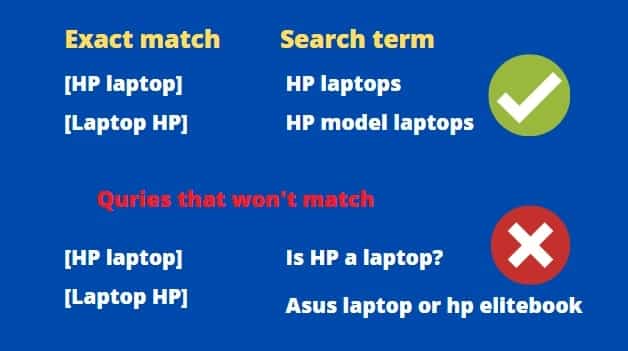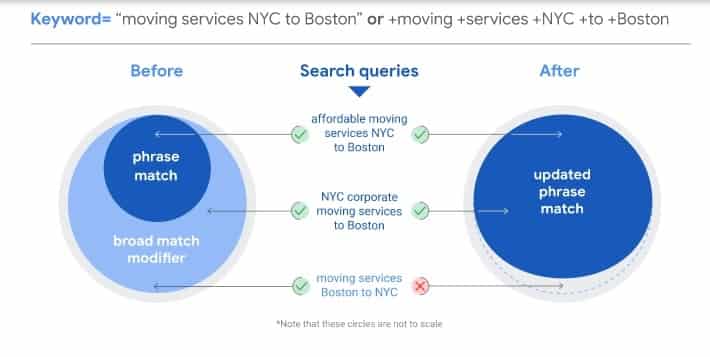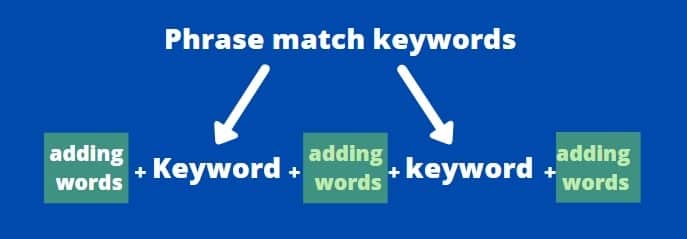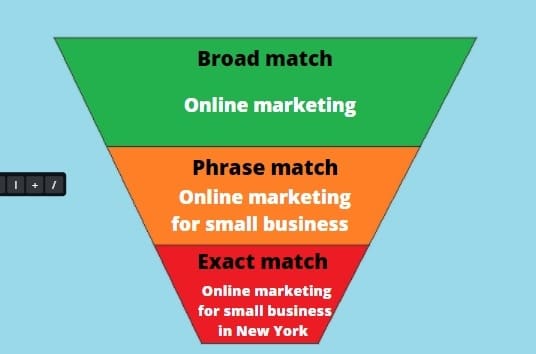Exact Match vs Phrase Match: Differences [Latest Updates]
![Exact Match vs Phrase Match Differences [Latest Updates]](https://wuclick.com/wp-content/uploads/2021/03/Exact-Match-vs-Phrase-Match-Differences-Latest-Updates.jpg)
There are several key areas in Google ads that can make or break your campaign performance.
One such area that requires your special attention and having some knowledge is using keyword match types.
There are 3 types of keyword match types available: exact, phrase, and broad match types.
In this article, I will compare and show you the differences of exact match vs phrase match keywords.
So, keep reading till the end, as I will go over their features and provide thorough explanations.
Brief descriptions
Exact match
Exact match as the name suggests shows your ads on the search engine results page whenever someone searches the exact or close variants of the keywords that you are targeting.
With exact match, you put brackets around your keywords.
For example, someone makes a search query of HP laptops and your ad shows up if you target the keywords [HP laptop] or [Laptop HP].

Phrase match
We have seen several updates of keyword match types. The latest one was in 2021.
That change affected the phrase match more than others.
Now, phrase match can do the job of previously used broad match modifier. Actually, it does it better than broad match modifier, because it doesn’t change the word order if the Google algorithm thinks it changes the meaning of the keyword.

Search terms can match with phrase match keywords by adding words before, after, and in between the words or when searched for close variants of the keywords.

To function as phrase match, you need to put quotes around your keywords.
What are keywords and search terms?
Keywords are the phrases or words that advertisers include in their campaigns. Search terms are the search queries customers make on the SERP to find advertisers’ products.
Now, let’s see the differences between the match types in more detail.
Close variants
Both exact and phrase matches have the same 6 types of close variants.
- Words with closely related syntax:
- Original Keyword: “buy red shoes”
- Close Variant: “purchase red footwear”
2. Reordered words with the same meaning:
- Original Keyword: “cheap flights to Paris”
- Close Variant: “flights to Paris cheap”
3. Adding or removing function words:
- Original Keyword: “best Italian restaurants near me”
- Close Variant: “best Italian restaurants in my area”
4. Implied words:
- Original Keyword: “weather forecast”
- Close Variant: “current weather conditions”
5. Synonyms and paraphrases:
- Original Keyword: “affordable hotels in New York”
- Close Variant: “budget-friendly accommodations in NYC”
6. Same search intent:
- Original Keyword: “how to lose weight fast”
- Close Variant: “tips for rapid weight loss”
Adding keywords
As we saw from the tables above, you can add a few phrase match keywords, to generate many different variations of keywords that your business needs.
And it doesn’t take too much time and effort to do that.
Exact match, on the other hand, requires you to add more keywords to describe your business in more detail. Because the keywords you choose are much more specific and may not be able to cover all the areas of your business activity individually.
Therefore, you need to spend more time on your keyword research and add as many keywords as possible to your campaigns.
Search volume
A couple of phrase match keywords would be enough to match your ads with thousands of long-tail search queries. That means the search volume you can get equals the sum of the search volumes of all the individual long-tail keywords.
However, exact match type can be a lot more restrictive and has fewer variations that have the same meaning or intent. Therefore, it has less search volume.
To achieve a higher volume of traffic with this keyword match type, you need to pick keywords with a higher search volume.
Control
When it comes to controlling the quality of the search terms that your ads can match, phrase match gives more authority to the automation and your ads can show up for search terms that are not relevant to your business.
Because it is controlled by Google AI and it may not fully understand the searcher intent behind your target keywords.
To remove some of those irrelevant clicks, you can add negative keywords and improve the efficiency of your ads.
With exact match type, you can have more control in matching your ads with the right search query because it can be more targeted.
But, over the years Google ads also expanded the reach of the exact match type and the search terms don’t have to be as exact as your keywords.
As a result, it takes some of the control from humans and gives it to automation, which may or may not be able to find the searcher intent.
Nevertheless, this option can give you the most amount of control out of all the match types in Google ads.
Key Performance Indicators (KPIs)
Click-through rate (CTR)
The more relevant your ads, the higher the CTR can be.
The search terms of phrase match can be less relevant compared to exact match keywords. Therefore, the CTR of ads with phrase match keywords is mostly lower than the ads with exact match type.
In one case study, when the total budget allocated across different match types, exact match received the CTR of twice as high as the phrase match, by 5.53% to 2.43% respectively.
Conversion rate (CVR)
As CTR and CVR are closely related to each other, a higher CTR with exact match drives more conversions to your website than phrase matches do.
In a case study run by Mainstreetroi, a website conversion increased by 41%, when they removed unnecessary ad clicks and changed their high performing keywords into exact match type.
Cost
Another important metric to compare exact vs phrase match is their total cost.
With phrase match, you are going to receive more clicks, and you spend more.
With exact match, even if you get a higher CTR, the total number of clicks you receive are much fewer, and therefore, you spend less.
It is cost-effective than other keyword match types and it is probably the best option for small businesses that want to spend their money as efficiently as possible.
You can also switch from phrase to exact match type to reduce your costs, after testing which of your keywords are more relevant to your business. (See related case study)
Which is better?
If you have a business that focuses on brand awareness, bringing new customers, and conversion, then you should consider using phrase match keywords.
If you have a business that only focuses on conversions by bringing a limited number of higher quality visitors to your website, then add exact match keywords to your campaigns.

As you can see from the picture, the customers in the lowest part of the funnel are much more qualified because they mainly make search queries with long-tail keywords (specific keyword phrases).
That means they have done their research before and they are much more aware of the products or services you offer.
However, with phrase match they are not that targeted, so the visitor to your website still might be in the awareness stage.
Conclusion
These were the most important differences between phrase and exact match types.
To optimize your campaigns even more, you can also incorporate other methods such as adding negative keywords or using smart bidding, depending on your resources and goals from running a campaign.
In any case, learn the keyword match types thoroughly before you spend your hard-earned money on Google ads.
Do you have any other questions about the article?
Then I have for you. Which keyword match type you want to use for your campaigns?
Let me know in the comments section below…
For any help in your Google ads management, you can reach me out through the Contact page.

